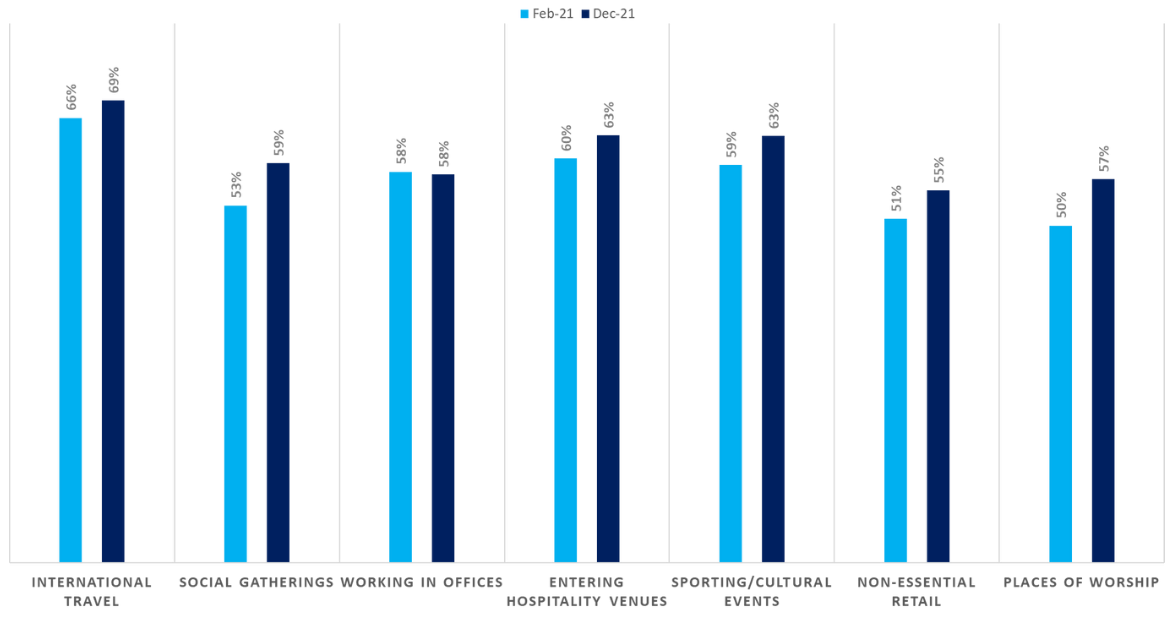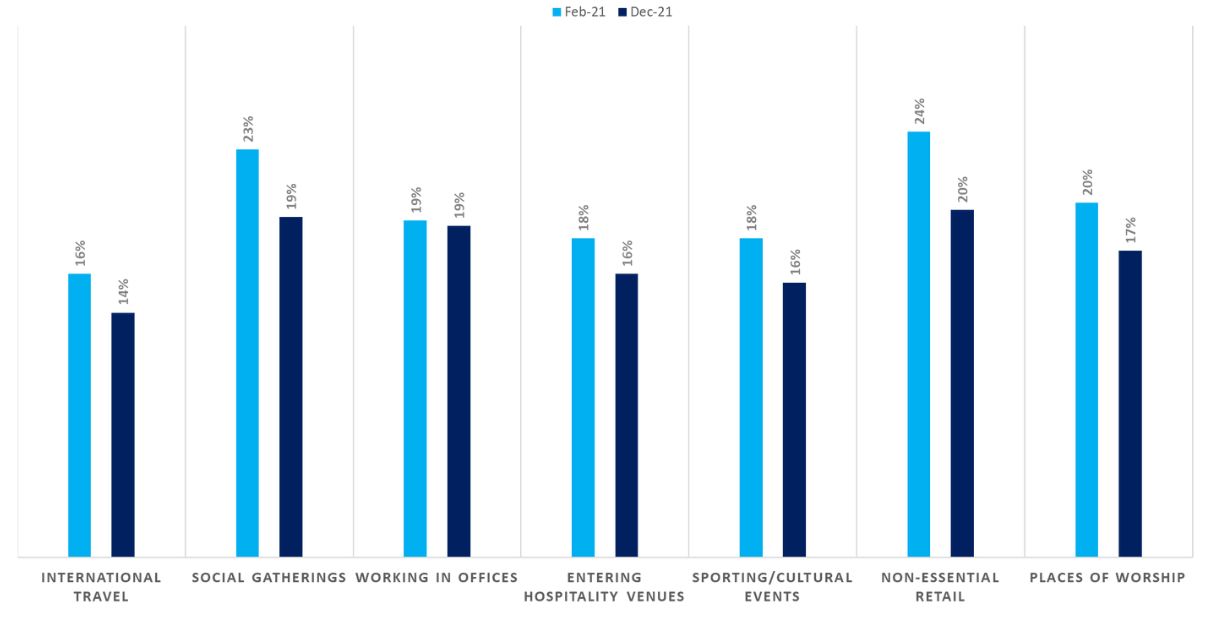
New polling for the Serco Institute has found that public support for vaccine passports in the UK has risen since they were first explored in February this year.
Following our poll at the start of 2021, which found significant support for vaccine passports across a wide range of settings in the UK, the Serco Institute has – working with the same independent polling experts at Survation – undertaken an identical survey which has measured changes in public support for their introduction.
The research found that support for vaccine passports has risen by a (mean) average of four percentage points across the seven public settings we asked about.
This new data comes immediately in the wake of a UK Government announcement that NHS Covid Passes (known commonly as vaccine passports) will be required for entry to a number of venues across England.
The emergence of the Omicron variant has clearly impacted people’s behaviour already, but this poll confirms that there is a growing willingness for measures to be reintroduced that may supress the circulation of the virus.
Vaccine passports were first discussed in public policy circles in early 2021 as a possible measure to mitigate transmission of the virus and were introduced in a number of European countries, starting with France’s pass sanitaire, over the summer. In England, plans to introduce Covid passes for entry into clubs and other crowded events were scrapped in September.
Today, however, Prime Minister Boris Johnson confirmed that ‘Covid certification’ would be introduced across a number of different settings in England. The guidance released so far indicates that:
“NHS Covid Pass mandatory for entry into nightclubs, and venues where large crowds gathe including unseated indoor venues with more than 500 people; unseated outdoor venues with more than 4,000 people; and any venue with more than 10,000 people. The NHS Covid Pass can still be obtained with two doses but we will keep this under review as the boosters roll out. A negative lateral flow test will also be sufficient.”
The Institute does not take a position on whether vaccine passports should be introduced. The research was conducted with the view to understanding compliance and support for vaccine passports and how this might impact frontline workers and public services who will have to implement any ‘Covid certification’ system.
The new research shows that public support for vaccine passports has risen since February by at least three percentage points across six of the seven settings we asked about, while opposition to their use has fallen by at least two points. Only for the setting Entering places of work did respondents return unchanged levels of support for and opposition to vaccine passports (58% Support / 19% Oppose).
|
Setting |
February 2021 |
December 2021 |
Change |
|
66% Support / 16% Oppose |
69% Support / 14% Oppose |
+3 / -2 |
|
60% Support / 18% Oppose |
63% Support / 16% Oppose |
+3 / -2 |
|
58% Support / 19% Oppose |
58% Support / 19% Oppose |
- / - |
|
59% Support / 18% Oppose |
63% Support / 15% Oppose |
+4 / -3 |
|
51% Support / 24% Oppose |
55% Support / 20% Oppose |
+4 / -4 |
|
53% Support / 23% Oppose |
59% Support / 19% Oppose |
+6 / -4 |
|
50% Support / 20% Oppose |
57% Support / 17% Oppose |
+7 / -3 |
Across all seven settings, there is majority support for the introduction of vaccine passports, ranging from 55% support for their use in Non-essential retail to a whopping 69% in International travel, where they are already in place. Support for vaccine passports across all polled areas outstripped opposition by at least 36 percentage points. The settings which saw the largest increase in support for vaccine passports was Places of worship, where support rose seven points between February and December, from 50% to 57%, and Social gatherings, where support increased from 53% to 59%.

Opposition fell most sharply, by four points, for Social gatherings (to 19%) and for Non-essential retail (to 20%, the highest level of opposition registered).

Older age groups were consistently more likely than younger survey takers to support vaccine passports, with support among 55-64-year-olds and over-65s never dipping below 60% across all settings. For International travel, overwhelming majorities of older respondents (81% of 55-64-year-olds, 82% of over-65s) were in favour of vaccine passports. By contrast, across six of the seven settings, 35-44-year-olds were least likely to support vaccine certificates. This led in some instances to startling disparities, with, for instance, two-thirds (67%) of 55-64-year-olds supporting vaccine passports for Places of worship but only 44% of 35-44-year-olds and 47% of 18-34-year-olds feeling the same. This is perhaps a reflection of older people’s far greater susceptibility to becoming severely ill and dying from Covid-19, as well as their far higher chances of being fully vaccinated, including having received booster doses.
Interestingly, as compared to backers of other political parties, Conservative voters were the most supportive of vaccine passports. Across all seven settings, Conservatives backed proof of vaccination status in greater numbers than their Labour, Liberal Democrat, Green and ‘Other’ voting counterparts: for instance, 75% of Conservatives supported vaccine passports for Entering hospitality venues, 10 points above Labour voters and 14 points above Liberal Democrats and Greens. Once again, this led to some large differences in opinion between Conservatives and respondents who voted Liberal Democrat or Green, who emerged as the two groups of voters least supportive of vaccine passports. While, for instance, seven in 10 Conservatives were in favour of vaccine passports being used in Social gatherings, just 53% of Liberal Democrats and less than half (49%) of Greens shared their view. Part of this may be attributable to Conservative voters being, in aggregate, older than those of other parties, with over 60% of over-65s voting Conservative at the 2019 general election[1].
There also existed some variation between the UK nations, although data regarding Wales should be regarded with caution given the small sample size of respondents and Northern Ireland’s respondents were below the minimum base of 30 and therefore cannot offer credible data. English respondents were generally less supportive of vaccine passports than their counterparts in Scotland and Wales, although this varied based on setting. Scottish and Welsh support for vaccine passports was higher than the UK average across five and six of the seven settings respectively, with Sports & cultural events the only setting where both Scotland and Wales recorded below-average support. Notably, with regard to Entering hospitality venues, support for vaccine passports here was lower in England (62%), where Covid certification has not been introduced, than in Scotland (65%) and Wales (77%), where Covid certificates are already in effect in a range of hospitality settings. The continuing public support for the vaccine certification schemes in place in those nations for months may be a comfort to UK ministers now considering introducing these measures to England. However, all UK nations showed majority support for vaccine passports across all seven settings.
Broadly, therefore, vaccine passports continue to enjoy a broad degree of support from the British public, across differing demographics, geographies and political affiliations. As the UK Government looks to tighten restrictions to slow the spread of the Omicron variant, ministers may find some reassurance that at least one of the pillars of their Plan B Covid containment strategy has provisional public support.
[1] 'Age, not class, is now what divides British voters most' – The Guardian.
Polling was conducted by Survation via online polls. Data were weighted to the profile of all people in the United Kingdom, according to Office for National Statistics data. Differential response rates from different demographic groups were taken into account.
For our survey earlier this year, polling was undertaken between 2-5 February. 1,003 people aged 18+ living in the United Kingdom were polled. Our latest poll was conducted between 30 Nov – 1 Dec. The survey covered 1,060 people aged 18+ living in the UK.